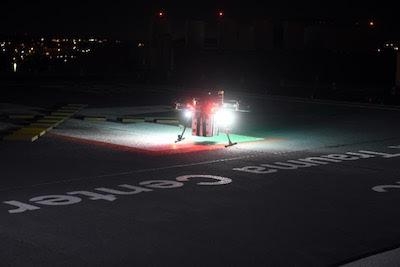Provides Flight Monitoring For World's First Unmanned Aircraft Delivery Of Donor Organ For Transplant Surgery In An Urban Environment
AiRXOS, a part of GE Aviation, participated in the world's first unmanned aircraft (UA) flight that delivered a donor kidney to surgeons in Baltimore, Maryland for successful transplantation into a patient with kidney failure. The momentous flight was a collaboration between transplant physicians and researchers at the University of Maryland School of Medicine (UMSOM) in Baltimore; aviation and engineering experts at the University of Maryland (UMD); and collaborators at the Living Legacy Foundation of Maryland (The LLF). While organ transport by drone has been previously tested successfully between medical facilities by the University of Maryland UAS Test Site in St. Mary's County, this is the first time the flight operation was used to deliver an organ for transplant.

The unmanned aircraft system (UAS) flight operation was monitored by AiRXOS' Air MobilityTM Platform, a rich, cutting-edge grade framework enabling unmanned traffic management applications, operations and services. The Air Mobility Platform manages the volume, density, and variety of unmanned traffic data, while coordinating and integrating that data within a secure, FAA-compliant, gated cloud environment to ensure safe unmanned operations.
Among the many technological firsts of this effort include: a specially designed, high-tech apparatus for maintaining and monitoring a viable human organ; a custom-built UAS with eight rotors and multiple powertrains to ensure consistently reliable performance, even in the case of a possible component failure; the use of a mesh network radios to control the UAS, monitor aircraft status, and provide communications for the ground crew at multiple locations; and aircraft operating systems that combined best practices from both UAS and organ transport standards.
On Friday, April 19th, at approximately 12:30 am, a human donor kidney was loaded onto the UMMC drone. The flight, led by the University of Maryland UAS Test Site at St. Mary's County, commenced at 1:00 am. The vehicle traveled 2.6 miles and flew for approximately 10 minutes. The human kidney was successfully delivered to University of Maryland Medical Center (UMMC) and was scheduled to be used for a transplant surgery at 5:00 am.
"AiRXOS is honored to have taken part in this landmark moment in medical and aviation history," says Ken Stewart, CEO, AiRXOS. "This flight demonstrated how air mobility can transform the delivery of medical care in ways that can have significant impact on lives. It lays the foundation for future advanced drone operations. AIRXOS is privileged to have worked closely with the UMD team in helping perform this historic flight."
"Having a robust and highly capable partner like AiRXOS teaming with us not only gave us a greater confidence for this particular operation, it really sets the stage for future Unmanned Traffic Management and Beyond Visual Line of Sight research efforts," said Matt Scassero, director of the University of Maryland Unmanned Aircraft System Test Site in St. Mary's County.
Maryland faculty and researchers believe this prototype organ transport blazes a trail for the use of UAS to expand access to donated organs, improving outcomes for more people in need of organ transplants. Currently organs are transported by commercial aircraft or charter flights. Organ transplants have a limited window of cold ischemia time (CIT) in which an organ can be chilled and then have blood supply restored. As of January 2019, almost 114,000 individuals were on the national transplant waiting list and every day approximately 80 people receive organ transplants, according to the United Network for Organ Sharing - the nonprofit that manages the transplant system. For sensitive medical deliveries, reducing the amount of travel time in urban settings, as well as vibration during travel can help lead to better outcomes.
(Image provided with AiRXOX news release)
 NTSB Final Report: Rutan Long-EZ
NTSB Final Report: Rutan Long-EZ ANN FAQ: Turn On Post Notifications
ANN FAQ: Turn On Post Notifications Classic Aero-TV: ICAS Perspectives - Advice for New Air Show Performers
Classic Aero-TV: ICAS Perspectives - Advice for New Air Show Performers ANN's Daily Aero-Linx (06.28.25)
ANN's Daily Aero-Linx (06.28.25) Aero-News: Quote of the Day (06.28.25)
Aero-News: Quote of the Day (06.28.25)



